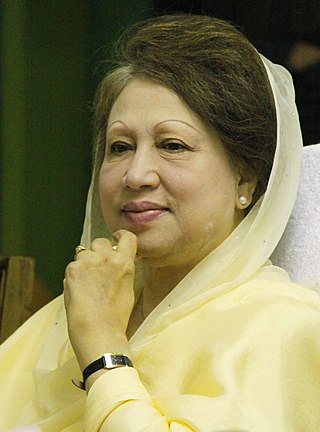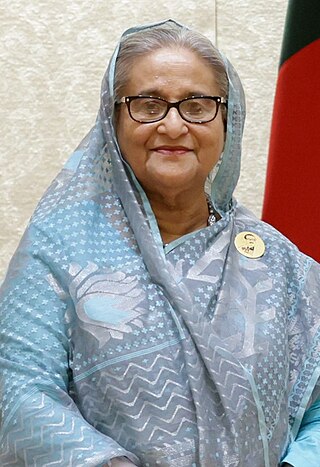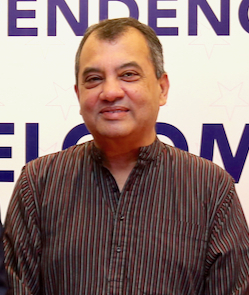
Politics of Bangladesh takes place in a framework of a parliamentary representative democratic republic, whereby the Prime Minister of Bangladesh is the head of government and of a multi-party system. Executive power is exercised by the government. Legislative power is vested in both the government and parliament. The Constitution of Bangladesh was written in 1972 and has undergone seventeen amendments.

Begum Khaleda Zia is a Bangladeshi politician, who served as the prime minister of Bangladesh from 1991 to 1996 and again from 2001 to 2006. She was the first female prime minister of Bangladesh and second female prime minister in the Muslim world, after Benazir Bhutto. She is the widow of one of the former president of Bangladesh, Ziaur Rahman. She is the chairperson and leader of the Bangladesh Nationalist Party (BNP) since 1984, which was founded by her husband in 1978.

The prime minister of Bangladesh, officially prime minister of the People's Republic of Bangladesh, is the chief executive of the government of Bangladesh. The prime minister and the cabinet are collectively accountable for their policies and actions to the Parliament, to their political party and ultimately to the electorate. The prime minister is ceremonially appointed by the president of Bangladesh.

The Jatiya Sangsad, often simply referred to as Sangsad and also known as the House of the Nation, is the supreme legislative body of Bangladesh. The current parliament of Bangladesh contains 350 seats, including 50 seats reserved exclusively for women. Elected occupants are called members of Parliament, or MPs. The 12th national parliamentary election was held on 7 January 2024. Elections to the body are held every five years, unless a parliament is dissolved earlier by the President of Bangladesh. On 6 August 2024, President Mohammed Shahabuddin dissolved parliament after the resignation of Sheikh Hasina and ordered to form an interim government.

Sheikh Hasina is a Bangladeshi politician who served as the tenth prime minister of Bangladesh from June 1996 to July 2001 and again from January 2009 to August 2024. She is the daughter of Sheikh Mujibur Rahman, the first president of Bangladesh. She served in the position of prime minister for over 20 years, making her the longest-serving prime minister in history of Bangladesh. Thus, she became the world's longest-serving female head of government. Her authoritarian regime ended in self-imposed exile following an uprising in 2024.

Bangladesh elects on national level a legislature with one house or chamber. The unicameral Jatiyo Sangshad, meaning national parliament, has 350 members of which 300 members are directly elected through a national election for a five-year term in single-seat constituencies while 50 memberships are reserved for the women who are selected by the ruling party or coalition. The Prime Minister is the head of the government. The president who is the head of the state is elected by the National Parliament. The president of Bangladesh is a ceremonial post and does not exercise any control over the running of the state.

The Jatiya Party (Bengali: জাতীয় পার্টি, romanized: Jatiyo Party, lit. 'National Party'; JaPa or JP(E)) is a political party in Bangladesh. The current chairman of the party is Ghulam Muhammed Quader. On 3 January 2019, the party announced its decision to join the Bangladesh Awami League-led Grand Alliance after having been in opposition for the previous parliamentary term. However, the party backtracked the next day and announced that it intended to remain part of the opposition.

Saber Hossain Chowdhury, OF is a Bangladeshi politician and a former Jatiya Sangsad member representing the Dhaka-9 constituency during 2008–2024. He was the president of Inter-Parliamentary Union from 2014 to 2017. He is a former president of the Bangladesh Cricket Board. He received the Order of Friendship, Russia's highest state decoration.

General elections were held in Bangladesh on 29 December 2008. The two main parties in the election were the Bangladesh Nationalist Party (BNP), led by Khaleda Zia, and the Bangladesh Awami League Party, led by Sheikh Hasina. The Bangladesh Awami League Party formed a fourteen-party Grand Alliance including Ershad's Jatiya Party, while the BNP formed a four-party alliance which included the Islamist party Jamaat-e-Islami. The election was originally scheduled for January 2007, but it was postponed by a military-controlled caretaker government for an extended period of time.
General elections were held in Bangladesh on 27 February 1991. The Bangladesh Nationalist Party (BNP) emerged as the largest party in parliament, winning 140 of the 300 directly elected seats. The BNP formed a government with the support of Jamaat-e-Islami Bangladesh and on 20 March Khaleda Zia was sworn in for her first term as Prime Minister.

General elections were held in Bangladesh on 12 June 1996. The result was a victory for the Bangladesh Awami League, which won 146 of the 300 directly elected seats, beginning Sheikh Hasina's first-term as Prime Minister. Voter turnout was 75%, the highest to date. This election was the second to be held in 1996, following controversial elections held in February a few months earlier.

The history of Bangladesh (1971–present) refers to the period after the independence of Bangladesh from Pakistan.

General elections were held in Bangladesh on 5 January 2014, in accordance with the constitutional requirement that elections must take place within the 90-day period before the expiration of the term of the Jatiya Sangshad on 24 January 2014.

General elections were held in Bangladesh on 30 December 2018 to elect 300 directly-elected members of the Jatiya Sangsad. The result was another landslide victory for the Awami League-led Grand Alliance led by Sheikh Hasina. The elections were marred by violence, and were widely considered by opposition politicians and the international community to be rigged.
Noor-E-Alam Chowdhury is a Bangladesh Awami League politician and a former Jatiya Sangsad member representing the Madaripur-1 constituency and the former chief whip of the Jatiya Sangsad. He has been missing, along with his brother Mujibur Rahman Chowdhury (Nixon) and other family members, since the resignation of his aunt Sheikh Hasina on 5 August 2024.

General elections were held in Bangladesh on 7 January 2024 in accordance with the constitutional requirement, stating that elections must take place within the 90-day period before the expiration of the current term of the Jatiya Sangsad on 29 January 2024. The Awami League, led by incumbent Sheikh Hasina, won the election for the fourth consecutive time with less than 10% of the eligible voters voting according to an Election Commission, which is run by the ruling political party. The party won 224 seats while independent candidates, most of whom were Awami League members propped up as dummy candidates to give a semblance of competition, won 62 seats.

General elections are expected to take place in Bangladesh following the removal of the government of Sheikh Hasina amidst the Student–People's uprising in August 2024. A constituent assembly election will take place before the general elections. The interim government led by Muhammad Yunus has established constitutional and election reform commissions for this purpose and announced that elections will be held in late 2025 or early 2026.

The Twelfth Jatiya Sangsad was formed with the elected members of the 2024 general election. The parliament was sworn in on 9 January 2024. On 11 January the ministers were sworn in. On 30 January the first session of the parliament took place. Out of the 350 seats 300 members are directly elected by the people and remaining 50 seats are reserved for women and are filled by proportional representation. Awami League won 258 out of the 300 seats and formed the government under the leadership of Sheikh Hasina. The Jatiya Party won 22 seats and became the main opposition party. After Prime Minister Sheikh Hasina resigned and fled the country on 5 August 2024, President Mohammed Shahabuddin dissolved the parliament the following day, on 6 August 2024.

General elections are held in Bangladesh to elect members of the Jatiya Sangsad, the unicameral national parliament. The Jatiya Sangsad consists of 300 members elected by first-past-the-post voting in single-member constituencies and 50 seats reserved for women, which are allocated based on the proportional vote share received by parties. Elections are overseen by the Bangladesh Election Commission.

Sheikh Hasina's tenure as Prime Minister of Bangladesh began on 23 June 1996, when she assumed office after her party, the Awami League, won the general election, succeeding Khaleda Zia's Bangladesh Nationalist Party (BNP). Her first term lasted until 15 July 2001. She returned to office on 6 January 2009 following her party’s landslide victory in the 2008 general election and had further electoral wins in 2014, 2018 and 2024 general elections, though these elections was widely criticised for lacking transparency, with opposition parties boycotting those elections and international observers alleging vote manipulation and suppression.















